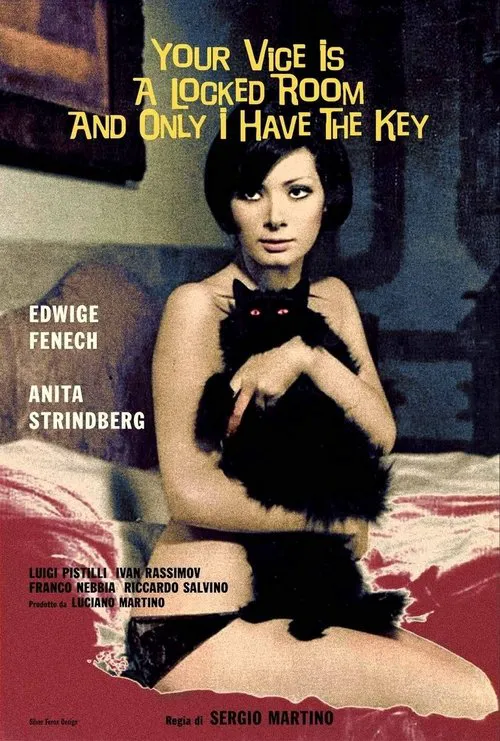Your Vice Is a Locked Room and Only I Have the Key

Plot
In the 1972 Italian thriller film "Your Vice Is a Locked Room and Only I Have the Key" directed by Sergio Martino, Oliviero Rulli, played by Luigi Pistilli, lives a lavish yet troubled life. As a drunk and struggling writer, he often invites a large entourage of women to his grand estate to indulge in orgies and exploit their desires. These events not only provide a distraction from his failed marriage to his wife Irina, but they also give Oliviero a sense of power and control over these women. The story begins with Oliviero hosting one of these events at his mansion, which is an extravagant and opulent space filled with lavish decorations, expensive artwork, and an extensive library. It is clear that Oliviero's life is a facade, and he is desperately trying to maintain a sense of status and sophistication to hide his own emptiness and feelings of despair. Irina, his wife, appears to be a victim of his manipulation, tolerating his behavior in the hopes that he will eventually change. However, the events take a dark turn when a series of murders begins to occur. The killer targets Oliviero's acquaintances in gruesome and brutal fashion, displaying no mercy or regard for human life. The police investigation led by Detective Gennarini, played by Carla Gravina, is put on the case, and attention immediately falls on Oliviero as a suspect. The local police are not alone in suspecting Oliviero; the killer, in fact, leaves a taunting letter addressed to Oliviero, suggesting that the killer is intimately familiar with his private life and is determined to make an example of him. As the investigation unfolds, the line between Oliviero's fantasies and reality becomes increasingly blurred. The audience is presented with a glimpse into Oliviero's twisted inner world, where he fantasizes about killing his wife and the women who attend his parties. These visions are intertwined with the real-life events of the murders. The film cleverly employs a sense of ambiguity, making it difficult to distinguish between Oliviero's fantasies and the actual events of the crime. One of the central themes of the film is the blurring of reality and fantasy. Oliviero's actions are presented as a manifestation of his own twisted desires. He is not just a victim of circumstance; he is actively participating in his own downfall by embracing his darkest impulses. This ambiguity raises questions about the nature of guilt and responsibility. Is Oliviero truly responsible for the crimes committed, or is he simply a product of his own twisted psyche? The character of Irina is often overlooked in favor of Oliviero's more sensational exploits. However, she serves as a crucial aspect of the narrative by providing a voice of reason and sanity amidst Oliviero's chaos. Her character highlights the emotional toll that Oliviero's behavior has on those around him, serving as a reminder that his actions have consequences beyond his own private life. Throughout the film, Sergio Martino employs a unique visual style by juxtaposing the opulent settings and decadent atmosphere of Oliviero's mansion with the brutal and gory nature of the murders. This contrast serves to underscore the hypocrisy and excesses of Oliviero's lifestyle, emphasizing the empty and meaningless nature of his existence. In "Your Vice Is a Locked Room and Only I Have the Key," the director masterfully crafts a sense of tension and suspense, keeping the audience guessing as to the true identity of the killer. While the twists and turns of the plot keep the viewer engaged, the film also invites deeper consideration of the themes and ideas presented. The film raises difficult questions about the nature of free will, the blurred lines between reality and fantasy, and the consequences of our actions. Ultimately, the film ends with a haunting conclusion that is both shocking and thought-provoking, raising more questions than it answers and leaving the audience to ponder the true nature of Oliviero's guilt and the true identity of the killer.
Reviews
Recommendations




